Zaki suggested Bodhan and Van wait in the outer office while he instructed his office mates on the strategy for that evening’s activities. Half an hour later, Zaki emerged, rubbing his hands together. “We will go to 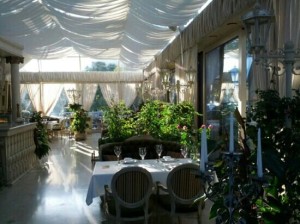 Restaurant Pushkin. We have good meal. Van pays, no?” Van nodded in agreement, hoping the restaurant took plastic as he was running short on cash after using most of his hryvnia for the fuel on the trip. The magazine had provided him with a company
Restaurant Pushkin. We have good meal. Van pays, no?” Van nodded in agreement, hoping the restaurant took plastic as he was running short on cash after using most of his hryvnia for the fuel on the trip. The magazine had provided him with a company  American Express card, which is supposed to be accepted all over the world. They were about to find out if that was true. Van hoped the consequences if they didn’t accept it wouldn’t be bad for him. It appeared to be that kind of town.
American Express card, which is supposed to be accepted all over the world. They were about to find out if that was true. Van hoped the consequences if they didn’t accept it wouldn’t be bad for him. It appeared to be that kind of town.
They entered the restaurant. The wait staff warmly greeted Zaki, and showed the three men to a table in the back. Zaki sat in the chair against the wall, but without comment. The waiter brought menus which were written in a language other than English – likely Ukrainian. Bodhan conversed with Zaki about the meal, and apparently came to agreement on the fare. The waiter came over, fawning obsequiously over Zaki, who seemed to enjoy the attention. Zaki spoke animatedly to the waiter, pointing at various items on the menu, but apparently suggesting variations, based on his body language. Ten minutes later, bowls of cold soup were put in front of each of them.  “Okroshka,” said Zaki, pointing at his bowl. “Goot.” Van took a tentative sip, and found it to be spicy, cold potato soup. Since he hadn’t eaten all day, other than some stale crackers Bodhan had given him, he ate the entire bowl with gusto.
“Okroshka,” said Zaki, pointing at his bowl. “Goot.” Van took a tentative sip, and found it to be spicy, cold potato soup. Since he hadn’t eaten all day, other than some stale crackers Bodhan had given him, he ate the entire bowl with gusto.
The waiter returned, cleared and bowls, and put down a large plate each of 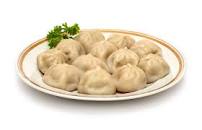 pelmeni and
pelmeni and 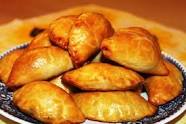 pirozhki, different varieties of meat dumplings. Each man put several of each dumpling on his side plate. Van begun to cut his and sample the fillings. Zaki and Bodhan dipped theirs in a sour cream mixture, and then ate them practically whole. Van tried to emulate their actions, but found it easier to just slice them up and eat. The dumplings were delicious plain.
pirozhki, different varieties of meat dumplings. Each man put several of each dumpling on his side plate. Van begun to cut his and sample the fillings. Zaki and Bodhan dipped theirs in a sour cream mixture, and then ate them practically whole. Van tried to emulate their actions, but found it easier to just slice them up and eat. The dumplings were delicious plain.
The waiter brought a main course of a cold chicken, surrounded mostly by root vegetables. He sliced the chicken expertly, with a long, sharp 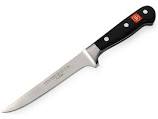 boning knife. He withdrew the knife from a sheath attached to a thin leather belt over his apron. Van took a section of the chicken breast, and a helping of the vegetables. All three men were literally eating and licking their fingers, as the sliced up chicken began to disappear. All that was left when they were through was the carcass and a few leeks. The waiter withdrew those plates.
boning knife. He withdrew the knife from a sheath attached to a thin leather belt over his apron. Van took a section of the chicken breast, and a helping of the vegetables. All three men were literally eating and licking their fingers, as the sliced up chicken began to disappear. All that was left when they were through was the carcass and a few leeks. The waiter withdrew those plates.
They had an apple tart and coffee with Irish whiskey for dessert. Bohdan and Zaki carried on a spirited conversation, until Bohdan seemed to realize it was rude to speak Ukrainian in front of Van, who only spoke English. Bohdan said, “Zaki says they read poetry here after 8:30, if you’d like to stay and listen. 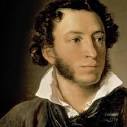 Pushkin’s poetry is wonderful. Let me see if I can quote some for you. Bohdan looked thoughtfully to the side, and then began his recitation:
Pushkin’s poetry is wonderful. Let me see if I can quote some for you. Bohdan looked thoughtfully to the side, and then began his recitation:
And straight along the empty square
He runs and hears as if there were,
Just behind him, the peals of thunder,
Of the hard-ringing hoofs’ reminders,
A race the empty square across,
Upon the pavement, fiercely tossed;
And by the moon, that palled lighter,
Having stretched his hand over roofs,
The Brazen Horseman rides him after –
On his steed of the ringing hoofs.
And all the night the madman, poor,
Where’er he might direct his steps,
Aft him the Bronze Horseman, for sure,
Keeps on the heavy-treading race.
Van said, “That was very nice, Bohdan. Are you a fan of Pushkin’s?” Bohdan blushed a little. “I have a degree in Russian and English literature from the National University of Kiev. We spent a whole semester on the poems of Pushkin and Walt Whitman. Again, Bohdan launched into a poetry recitation:
O CAPTAIN! my Captain! our fearful trip is done;
The ship has weather’d every rack, the prize we sought is won;
The port is near, the bells I hear, the people all exulting,
While follow eyes the steady keel, the vessel grim and daring:
But O heart! heart! heart! 5
O the bleeding drops of red,
Where on the deck my Captain lies,
Fallen cold and dead.
“Thank you, Bohdan. That was lovely. But you don’t look old enough to be a college graduate. I thought you were about nineteen or twenty years old.” Van looked at Bohdan intently, as Bohdan continued to blush even more deeply. “I am 28 years of age. But I have yet to find a proper wife and to find a place to live so I can start my own family. The economy in Ukraine has not been very good under 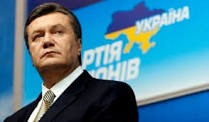 Yanukovych.” At the mention of Yanukovych, Zaki looked at Bohdan. He said some words in Ukrainian. Bohdan said, “Zaki was just saying that the nationalists staged a coup to remove the rightful president, Yanukovych.” Bohdan did not comment any further.
Yanukovych.” At the mention of Yanukovych, Zaki looked at Bohdan. He said some words in Ukrainian. Bohdan said, “Zaki was just saying that the nationalists staged a coup to remove the rightful president, Yanukovych.” Bohdan did not comment any further.
At last, Van began his interview with Zaki. The rebel leader was feeling a tender warmth for Van, with his having paid for this sumptuous meal and desire to interview him for a major American media outlet. Zaki put his elbows on the table, and launched into a long discourse about the revolt, with Bohdan translating as he went. Zaki said, “In 2012, we were a united country. Everyone struggled, but everyone was happy. Then, Yanukovych decided to ally himself with Russia instead of the European Union. He did this because the EU was looking at Ukraine as inferior. Vladimir Putin sees Ukraine as a valuable asset to his new ideas about a new federation that Ukraine and Crimea could join. But nationalists called 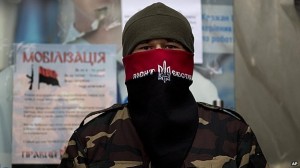 Right Sector staged the coup, and the country began to come apart.” Zaki paused to order another whiskey-laced coffee from the waiter. Van hoped that wouldn’t stimulate any violent thoughts in the rebel leader. But after taking a sip of the new coffee, Zaki continued with his explanation.
Right Sector staged the coup, and the country began to come apart.” Zaki paused to order another whiskey-laced coffee from the waiter. Van hoped that wouldn’t stimulate any violent thoughts in the rebel leader. But after taking a sip of the new coffee, Zaki continued with his explanation.
“Right sector attempted to come to the east, first to Harkew and then to Donetsk.” Van interrupted Zaki, asking Bohdan, “How do you spell Harkew?” Bohdan replied, “Kharkiv.” Van said, “OK, thanks. Sorry Zaki – please go on.” Zaki continued his recitation, with Bohdan translating. “Right sector came to Kharkiv, and we organized a protest to say we didn’t want them here. When they would not leave, but continued to harass citizens in that city, it was necessary to organize resistance. Thus far, we have prevailed over a much stronger force, both from the government of  Poroshenko as well as from Right Sector. They are neo-Nazis, anti-Russian and a dangerous lot.” Zaki paused for another sip of his whiskey-laced coffee. Bohdan waited patiently for him to continue.
Poroshenko as well as from Right Sector. They are neo-Nazis, anti-Russian and a dangerous lot.” Zaki paused for another sip of his whiskey-laced coffee. Bohdan waited patiently for him to continue.
“Now we are treated as lepers by the international community because of the incident with shooting down the 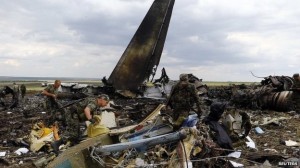 airliner. I will admit, mistakes were made, but we have removed the individual who authorized that act. We regret that it occurred, although airliners were warned to steer clear of the area as it was cleared defined as a war zone. But still, those innocents in that airplane – I regret their deaths. But in war, sometimes civilians are casualties.” Zaki paused and took another sip of coffee. Van said, “What you are your plans for the future?” Zaki replied, and Bohdan translated. “At the moment, we have a cease-fire. But it is not really a cease fire. We have just begun our guerilla war to remove the Right Sector fighters from the east. We just don’t fight Ukrainian government troops. They are not good fighters anyway. But our biggest problem now is lack of funds to purchase supplies and weapons. The sanctions have made Mr. Putin
airliner. I will admit, mistakes were made, but we have removed the individual who authorized that act. We regret that it occurred, although airliners were warned to steer clear of the area as it was cleared defined as a war zone. But still, those innocents in that airplane – I regret their deaths. But in war, sometimes civilians are casualties.” Zaki paused and took another sip of coffee. Van said, “What you are your plans for the future?” Zaki replied, and Bohdan translated. “At the moment, we have a cease-fire. But it is not really a cease fire. We have just begun our guerilla war to remove the Right Sector fighters from the east. We just don’t fight Ukrainian government troops. They are not good fighters anyway. But our biggest problem now is lack of funds to purchase supplies and weapons. The sanctions have made Mr. Putin 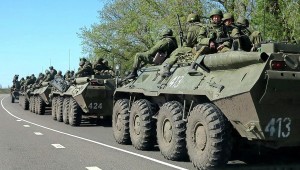 withdraw his aid for now. So we must find other ways to continue our fight in the absence of his support. And to that end, possibly you can help us with this.” Van asked, foolishly, “How can I help you with this? You are correct – the shooting down of that airliner was a huge mistake. And I don’t think anyone will help you out because of that act.” Bohdan hesitated, and then shared some version of Van’s words with Zaki. Zaki stared at Van. He then turned, and hollered at Bohdan. Zaki got up from his seat, and went to the back of the restaurant. Apparently he went to relieve himself of all the liquid he’d consumed at dinner.
withdraw his aid for now. So we must find other ways to continue our fight in the absence of his support. And to that end, possibly you can help us with this.” Van asked, foolishly, “How can I help you with this? You are correct – the shooting down of that airliner was a huge mistake. And I don’t think anyone will help you out because of that act.” Bohdan hesitated, and then shared some version of Van’s words with Zaki. Zaki stared at Van. He then turned, and hollered at Bohdan. Zaki got up from his seat, and went to the back of the restaurant. Apparently he went to relieve himself of all the liquid he’d consumed at dinner.
Bohdan looked at Van. “Zaki gave you this interview because he was led to believe you would be sympathetic to the cause. The history of eastern Ukraine goes back to the 1940’s, when  Tatars held the land, as they had for a thousand years. Stalin perceived that they had collaborated with the Nazis, and so when the Russian army came into Eastern Ukraine, the Taters were told to
Tatars held the land, as they had for a thousand years. Stalin perceived that they had collaborated with the Nazis, and so when the Russian army came into Eastern Ukraine, the Taters were told to 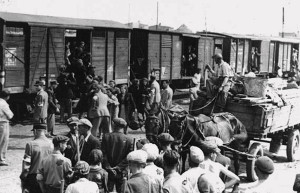 leave or die. Then Stalin brought Russian peasants in to occupy the Tatar’s houses, farms and land. These men you speak to now are the grandchildren of those Russian peasants. Until this occurred, they had never owned anything in their lives. They will not give up what they have without a fight. As I said before, these men are not to be trusted. Van, my friend, you must be careful in what you say to them.”
leave or die. Then Stalin brought Russian peasants in to occupy the Tatar’s houses, farms and land. These men you speak to now are the grandchildren of those Russian peasants. Until this occurred, they had never owned anything in their lives. They will not give up what they have without a fight. As I said before, these men are not to be trusted. Van, my friend, you must be careful in what you say to them.”
The rebel leader returned to the table, staring at Van as he dried his hands on his napkin. “So you appear to not understand our situation, and I don’t believe you are here to help us. You are here to portray us as others before you have – as thugs and murderers. We are not thugs and murderers. We are patriots. We are protecting that which is ours. And we will not give it up for anyone. We will die fighting for what is ours.” At that moment, the waiter brought the bill and presented it to Van. Van had no idea how much it was, since the number scrawled at the bottom of the piece of paper was clearly the Ukrainian currency. It said, “1497 UAH”, which Van took to mean nearly fifteen hundred Hryvnia. He did a quick calculation in his head and realized the dinner for the three of them was about $120, not including tip. He handed the American Express card to the waiter, and hoped it would work. It did. The waiter returned with a credit slip. Van added what he thought was a $20 tip to the slip. The waiter accepted it, looked at it, and frowned. He spoke quick words to Zaki, who spoke to Bohdan. Bohdan said, “You have added one dollar sixty cents as the tip. Is that what you had in mind?” Van quickly shook his head no. “No – I intended to add $20 to the tip. I’m sorry – I’m not used to these currency transactions.” The waiter scratched heavily through the number, and put down 250 UAH. Van signed the chit, and the waiter left, muttering something that sounded rather obscene. The three men got up, with Bohdan looking wistfully back at the platform in the corner of the restaurant. It was 8:25. Five more minutes, and the Pushkin 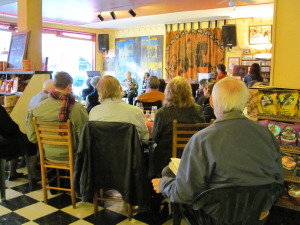 readings would begin. Instead, they started back toward the rebel’s headquarters to finalize the interview. Van hoped he hadn’t upset Zaki too much. He still needed to get some pictures, and then he would return to Kiev and go home. Things were just too hot in this part of the Ukraine, and he was seriously beginning to miss home. His apartment. But more than anything, he was beginning to miss Catherine and her sweet nature. “I will have to make some serious amends with her when I get home,” he thought as he walked the darkened
readings would begin. Instead, they started back toward the rebel’s headquarters to finalize the interview. Van hoped he hadn’t upset Zaki too much. He still needed to get some pictures, and then he would return to Kiev and go home. Things were just too hot in this part of the Ukraine, and he was seriously beginning to miss home. His apartment. But more than anything, he was beginning to miss Catherine and her sweet nature. “I will have to make some serious amends with her when I get home,” he thought as he walked the darkened 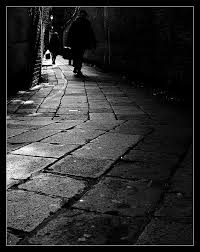 streets of Donetsk with Bohdan and Zaki. That was Van’s last thought before a van with its lights off pulled up next to them. The back left door slid open, and two men in ski masks stepped toward them. The bigger of the two grabbed Van’s arms, and the slightly smaller man grabbed his feet. They literally threw him in the van, and slid the door shut. The van took off with a roar, heaving Zaki and Bohdan in the street.
streets of Donetsk with Bohdan and Zaki. That was Van’s last thought before a van with its lights off pulled up next to them. The back left door slid open, and two men in ski masks stepped toward them. The bigger of the two grabbed Van’s arms, and the slightly smaller man grabbed his feet. They literally threw him in the van, and slid the door shut. The van took off with a roar, heaving Zaki and Bohdan in the street.
